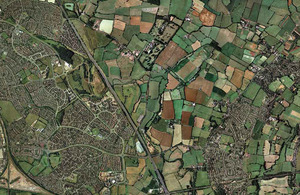Eric Pickles puts stop to flawed regional strategies
Revoking the regional strategies.

Local Government Secretary Eric Pickles is today (6 July 2010) putting a swift end to Whitehall’s grip on local planning policy by scrapping regional strategies and their centrally imposed building targets that failed to increase housebuilding.
Regional targets intended to build 3 million homes nationally by 2020 were put in place by the previous government despite fears that they would force councils to cut into the green belt. However, the reality is that construction has slowed down so much the country is facing the lowest peacetime housebuilding rates since 1924.
A statement laid in parliament today will revoke regional strategies with immediate effect. Councils will now have the freedom to prepare their local plans without having to follow top-down targets from regional quangos and bureaucrats that prescribe exactly what, where and when to build.
Mr Pickles also pledged that direct and substantial benefits for councils who support construction would be the centrepiece of this radical restoration of local power. The money will be used to help ensure more new homes are built for local people, and matched with more new jobs and investment.
From today, power will be handed back to councils and communities to make their own decisions on planning that can get the country building again. Communities will, once again, be able to solve local housing challenges in a way that makes sense for them. In return councils will be offered powerful new incentives that ensure they benefit from development they welcome.
Communities and Local Government Secretary Eric Pickles said:
“Communities will no longer have to endure the previous government’s failed Soviet tractor style top-down planning targets - they were a terrible, expensive, time-consuming way to impose house building and worst of all threatened the destruction of the green belt.
“I promised to get rid of them and today I’m revoking regional plans with immediate effect - hammering another nail in the coffin of unwanted and an unaccountable regional bureaucracy. They were a national disaster that robbed local people of their democratic voice, alienating them and entrenching opposition against new development.
“Regional Strategies built nothing but resentment - we want to build houses. So instead we will introduce powerful new incentives for local people so they support the construction of new homes in the right places and receive direct rewards from the proceeds of growth to improve their local area.”
Mr Pickles made the announcement in a keynote speech to the Local Government Association conference where he told town halls they were back in charge of local affairs.
Councils will now be free to protect Green Belt surrounding 30 towns across the country. The targets system forced them to redraw Green Belt boundaries and designate large areas of countryside for new development. Communities will now have the power to prevent encroachment on the Green Belt and decide themselves where they want to build.
Decentralisation Minister Greg Clark said:
“Today is another significant step in the Coalition Government’s drive to transfer powers from remote bureaucracies to local communities. Regional edicts, which allowed communities no say, injected poison into the planning system which stymied development. By allowing communities to shape their neighbourhoods and to share in the benefits, we are beginning to restore the idea that development can be a force for good, rather than something to be resisted at all costs.”
Further information
Communities Secretary Eric Pickles confirmed today in a Written Parliamentary Statement that regional strategies will be revoked with immediate effect, as set out in the Coalition Agreement. In the longer term the legal basis for Regional Strategies will be abolished through the Localism Bill that will be introduced in the current Parliamentary session.
Regional strategies have been revoked through Section 79 (6) of ‘The 2009 Local Democracy, Economic Development and Construction Act’. Accompanying the Parliamentary Statement is guidance for local authorities that covers the period between the revocation of regional strategies and legislation to abolish them altogether. A copy of the statement and guidance can be found on the DCLG website.
The abolition of regional strategies provides a clear signal of the importance attached to the development and application of local spatial plans, in the form of Local Development Framework Core Strategies and Development Plan Documents. Local plans drawn up with the help of the community will become the basis for local planning decisions, and future reform will make it easier for local councils to agree and amend local plans with their local community, in a way that maximises the involvement of neighbourhoods. The introduction of incentives to replace building targets will be a top priority for the new government and take place early in the spending review.
Towns and areas that were planning to make green belt cuts and reviews because of Whitehall-imposed targets will now be able to make their own decisions where new development is built. They include: Bath, Bedworth, Bournemouth, Bristol, Bromsgrove, Broxbourne, Cheltenham, Chertsey, Coventry, Gloucester, Guildford, Harlow, Hatfield, Hemel Hempstead, Leeds, Lichfield, Maidenhead, Newcastle-under-Lyme, Nottingham, Nuneaton, Oxford, Redditch, Redhill, Reigate, Rushcliffe, Stevenage, Solihull, Tunbridge Wells, Welwyn, and Woking and Worcester and in West Yorkshire beyond Leeds.